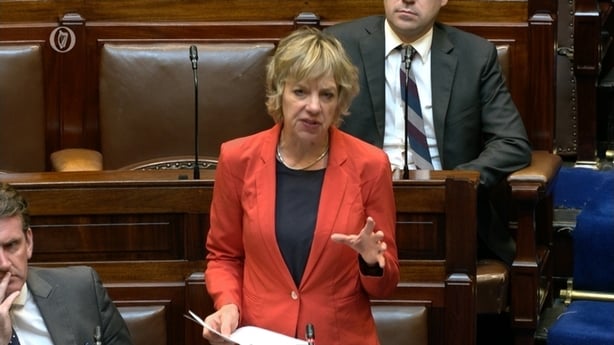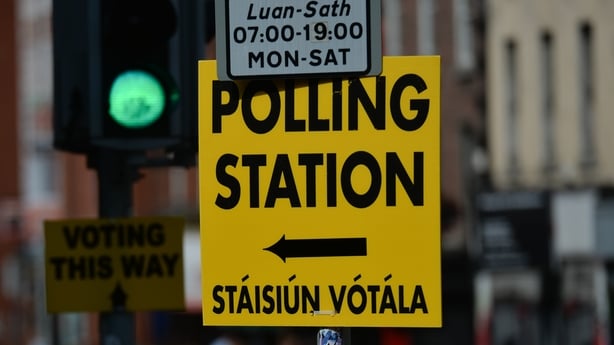Is there anything to be said for another referendum?
This isn't to belittle plans for a vote on changing the constitutional position on women in the home but you’d be forgiven for feeling a little weary of the whole shebang, considering the time it’s taken to come to fruition.
As far back as 1996, the Constitutional Review Group report recommended that Article 41.2 be amended to make it gender neutral.
Furthermore, commitments to hold the referendum since 2018 have repeatedly been missed.
So, why is the Government planning for a referendum and when will it take place?
Simply put, parts of the Constitution are clearly a product of their time, 1937, and need updating.
The article that references women in the home has been considered several times; by the Constitutional Convention in 2013, the Citizens Assembly on Gender Equality and a Joint Oireachtas Committee on Gender Equality.
The Citizens’ Assembly on Gender Equality met in February 2020 to consider the offending articles of Bunreacht na hÉireann.
Specifically, they looked at Article 40.1 and several sections of Article 41.
In its report published in June 2021, three recommendations were made on amending the Constitution.
The Citizens’ Assembly recommended that Article 40.1 should be amended to refer explicitly to gender equality and non-discrimination.
The report also recommended that Article 41 of the Constitution be amended so that it would protect private and family life, with the protection afforded to the family not limited to the marital family.
The report also recommended that Article 41.2 of the Constitution should be deleted and replaced with language that is not gender specific and obliges the State to take reasonable measures to support care within the home and wider community.
Article 41.2 states: "In particular, the State recognises that by her life within the home, woman gives the State a support without which the common good cannot be achieved."
It goes on to say: "The State shall, therefore, endeavour to ensure that mothers shall not be obliged by economic necessity to engage in labour to the neglect of their duties in the home."
The language is clearly archaic and is widely regarded as sexist as it does not make any mention of a man’s life in the home.

Furthermore, more than four in ten babies born in Ireland last year were born outside of marriage, so it’s well past time that the wording regarding the definition of the family in the constitution reflected a changed Irish society.
Article 41.3.1 states: "The State pledges itself to guard with special care the institution of Marriage, on which the Family is founded, and to protect it against attack."
A source close to the current referendum planning process said that what’s under consideration is removing the reference to women’s place in the home and replacing it with the recognition of care (Article 41.2) as well as broadening the definition of the family in Article 41.
But it’s understood that Article 40.1 will not be changed at this time.
That article says: "All citizens shall as human persons be held equal before the law."
This would mean that the suggestion by the Citizens’ Assembly to amend the Constitution to refer explicitly to gender equality and non-discrimination has been ignored, or at the very least parked for now.
Speaking in the Dáil in November 2022, Labour Leader Ivana Bacik expressed her concern that the proposed wording would "deviate from what we proposed in the Joint Committee on Gender Equality and what the Citizens' Assembly recommended".
While others have expressed fears that the referendum has been watered down, by not tackling the gender question.
So why has the Government decided not to proceed with all of the recommendations?
Privately, there have been fears expressed by some in and close to the Government that defining gender in the context of equality in the Constitution could be fraught with difficulties.
Taoiseach Leo Varadkar said in response to Ivana Bacik, "changing the Constitution is never straightforward. We always have to bear in mind how it might be interpreted by the courts".
Is that what’s behind the reluctance to make changes?
As regards the "women in the home" article, law lecturer at South East Technological University Dr Jennifer Kavanagh says she would simply "get rid of it" and delete the provision altogether, and she would choose June as the best time to hold the referendum, alongside the local and European elections, more on that later.
She says nobody has ever managed to rely on Article 40.1 to improve their lot.
"This article has never amounted to a hill of beans for people providing care in the home," she says.
It’s widely expected that Article 40.1 will be changed to remove the reference to women in the home, to be replaced with a reference to "care in the home".
Dr Kavanagh says there already exists a homemakers credit, which has "nothing to do with the Constitution" and applies to men and women.
She says that if people who are caring in the home, either keeping an eye on parents or disabled children, for example, this updated provision in the Constitution won’t give them any additional protection at all.
Dr Kavanagh says: "What’s there has never given women any protection.
"If you’re a carer under this new article and you want a better allowance, no article in the Constitution will get you money in your back pocket.
"That’s a policy decision and the courts will always let the Government legislate (in these circumstances)."

She says there are two ways of looking at the Constitution.
One, it’s an aspirational document that sets out the kind of society we wish to have or two, it’s a legal document designed to put control on the Government of the day so they can’t legislate in an unconstrained fashion.
She also doesn’t believe it’s possible to hold the referendum as early as March.
She says coming up with a modern definition of the family is going to prove complicated, from a legal perspective.
"Tax, social welfare, inheritance law will all come into it," she says.
As an example, if you’re in a cohabiting partnership and you die, the partner gets treated as a stranger in terms of inheritance.
Furthermore, she says that if you’re living with someone and they’re made redundant – your money is considered as part of their calculations, but there’s no credit for you because you’re not married.
Dr Kavanagh says all of these issues will need to be addressed before March and she believes that timeline is too tight.
This afternoon the Government confirmed plans to hold the vote on International Women's Day, 8 March.
Ireland’s new electoral commission, An Coimisiún Toghcháin, says it expects a referendum to take place early next year.
Part of its job is to "provide independent, impartial information about the questions being put to the people".
It says: "A full information campaign for referendums takes from 14 to 16 weeks...we will deliver the best and most comprehensive information campaign possible within the timeframe presented to us by Government."






